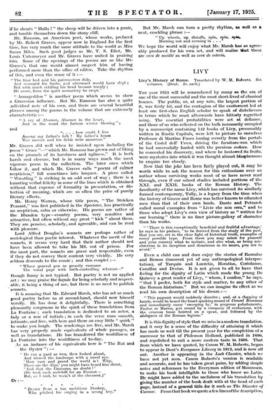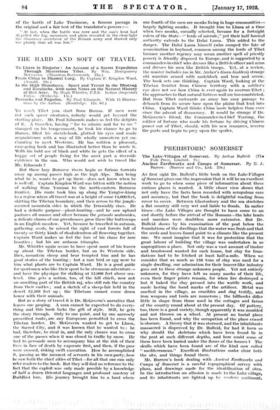LIVY
Livy's History of Rome. Translated by W. M. Roberts. Six volumes. (Dent. 2s. each.) THE year 1924 will be remembered by many as the era of one of the most successful and the most short-lived of classical hoaxes. The public, or, at any rate, the largest portion of it, was fairly bit, and the contagion of the excitement led at least one first-class English scholar to speak of disbelievers
in terms which he must afterwards have bitterly regretted using. The essential probabilities were set at defiance, and those of us who reflected on the bulk necessarily occupied by a manuscript containing 142 books of Livy, presumably written in Rustic Capitals, were left to picture to ourselves Professor di Martino Fusco issuing secretly from the portals of the Castel dell' Uovo, driving the furniture-van which
he had successfully loaded with the precious codices. How he concealed his discovery, and where he bestowed its fruits,
were mysteries into which it was thought almost blasphemous to enquire too closely.
Now that the joke has been fairly played out, it may he worth while to ask the reason for this enthusiasm over an author whose surviving works most of us have never read
through, even if our school studies included portions of the XXI. and XXII. books of the Roman History. The familiarity of the name Livy, which has survived its similarly formed contemporary, Tully, is a legacy from the time when the history of Greece and Rome was better known to educated men than that of their own lands. Dante and Petrarch culled moral examples from " Livio she non errs," and to those who adopt Livy's own view of history as " written for our learning " there is no finer picture-gallery of character than his works.
" There is this exceptionally beneficial and fruitful advantage,' ho says in his preface, ' to be derived from the study of the past, that you see, set in the clear light of historical truth, examples of every possible type. From these you may select for yourself and your country what to imitate, and also what, as being mis- chievous in its inception and disastrous in its issues, you are to avoid.' "
Even a child can and does enjoy the stories of Romulus and Remus (innocent yet of any anthropological interpre-
tation), of Tarquin and Lucretia, Horatius, Coriolanus, Camillus and Decius. It is not given to all to have that feeling for the dignity of Latin which made the young De Quincey a great reader of Livy, " whom, I confess," he says,
" that I prefer, both for style and matter, to any other of the Roman historians." But we can imagine its effect as we read his own description of his dream :—
" This pageant would suddenly dissolve ; and, at a clapping of hands, would be heard the heart-quaking sound of Consul Rornanus and immediately came sweeping by,' in gorgeous paludaments, Paulus or Marius, girt round by a company of centurions, with the crimson tunic hoisted on a spear, and followed by the alalagntos of the Roman legions."
It is this dignity of style that we miss in a modern translation,
and it may be a sense of the difficulty of attaining it which has made us wait till the present year for the completion. of a successor to that of Philemon Holland, published in 1600, and repolished to suit a more modern taste in 1686. That from which we have quoted, by Canon W. M. Roberts, began to appear in Dent's Everyman Library in 1912, and is now all out. Another is appearing in the Loeb Classics, which we have not yet seen. Canon Roberts's version is readable and accurate, and he has taken great pains, by adding simple
notes and references to the Everyman edition of Mommsen, to make his book intelligible to those who know no Latin.
He might have added to the usefulness of his translation by giving the number of the book dealt with at the head of each page, instead of a general title-for it such as The Disaster of Cannac. From that book we quote a few lines of the description,
of the battle of Lake Trasimene, a famous passage in the original and a fair test of the translator's powers :—
" At last, when the battle was over and the sun's heat had dispelled the fog, mountain and plain revealed in the clear light the disastrous overthrow of the Roman army and showed only too plainly that all was lost."











































 Previous page
Previous page